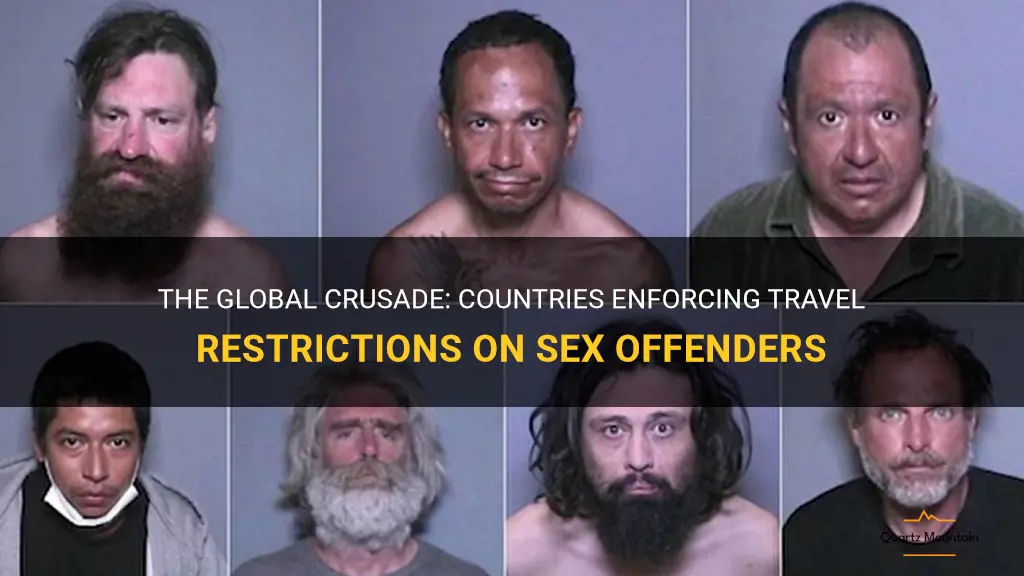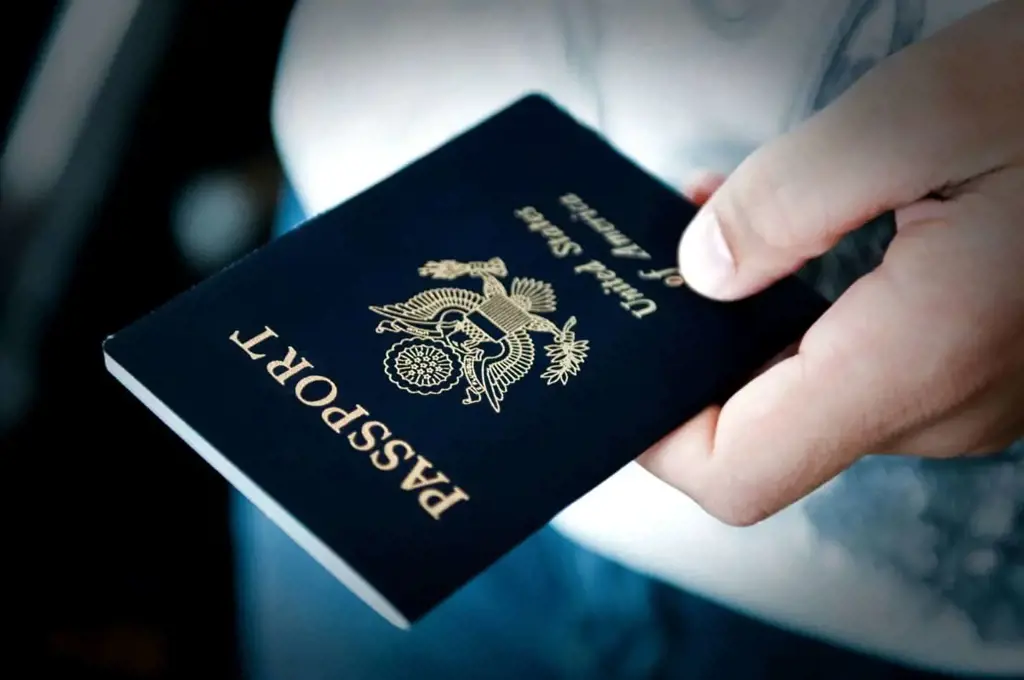
When it comes to international travel, there are certain countries that may not be as welcoming to everyone. In an effort to protect their citizens, some countries have implemented sex offender travel restrictions, effectively banning individuals with a history of sexual offenses from entering their borders. These restrictions aim to maintain public safety and ensure the well-being of their communities. While controversial, these measures demonstrate the global effort to address and prevent such crimes, making it crucial for potential travelers to be aware of these policies before planning their trips.
What You'll Learn
- Which countries have sex offender travel restrictions in place?
- What are the specific restrictions and regulations that these countries have implemented for sex offenders?
- How do these restrictions affect individuals who have been convicted of a sex offense and are looking to travel internationally?
- Are there any exceptions or variations in these travel restrictions based on the severity or nature of the offense?
- What implications do these restrictions have for international cooperation and communication between countries in cases involving sex offenders?

Which countries have sex offender travel restrictions in place?

Sex offender travel restrictions vary by country. Many countries have implemented measures to prevent sex offenders from traveling to or residing within their borders to protect their citizens from potential harm. These restrictions seek to ensure the safety of individuals, particularly children, who may be vulnerable to sexual offenses.
One such country with strict sex offender travel restrictions is the United States. The United States has the International Megan's Law, which requires the registration of convicted sex offenders and provides authorities with information on their international travel plans. Under this law, the US government can notify other countries when a registered sex offender is planning to travel there. Additionally, some states in the US have implemented their own restrictions, such as preventing registered sex offenders from living near schools or other places where children gather.
Canada is another country with significant sex offender travel restrictions in place. The Canadian government monitors the travel of registered sex offenders and can deny them entry or require them to report their travel plans in advance. Canada also has strict laws regarding the reporting of sex offenses, requiring individuals convicted of sex crimes to register as sex offenders and provide ongoing updates on their whereabouts.
The United Kingdom also has sex offender travel restrictions aimed at protecting its citizens. Convicted sex offenders in the UK are required to notify the authorities of any international travel plans. The government can then share this information with other countries to prevent potential harm. Additionally, the UK has legislation in place that allows for the notification of individuals or organizations if someone with a history of sexual offenses may pose a risk to specific individuals or communities.
Australia has its own measures in place to restrict the travel of sex offenders. The Australian government has the Overseas Travel Notification Scheme, which requires registered sex offenders to provide details of their travel plans if they are planning to travel abroad. This information is then shared with the appropriate authorities to monitor and potentially prevent any potential risks.
Other countries, such as Germany, France, and New Zealand, also have sex offender travel restrictions in place. These restrictions vary by country and can range from requiring registered sex offenders to provide advance notification of travel plans to outright bans on entry. It is important for individuals who have been convicted of sex offenses to be aware of these restrictions and comply with any requirements put in place by the countries they wish to visit.
In conclusion, many countries have implemented sex offender travel restrictions to protect their citizens, particularly children, from potential harm. These restrictions vary by country and can range from requiring registered sex offenders to provide advance notification of travel plans to outright bans on entry. It is crucial for individuals with a history of sex offenses to be aware of these restrictions and comply with any requirements set by the countries they wish to visit.
Understanding Bali's Travel Restrictions for Vaccinated Travelers
You may want to see also

What are the specific restrictions and regulations that these countries have implemented for sex offenders?

Sex offenders face strict regulations and restrictions in many countries around the world. These measures are in place to protect society and to ensure that offenders do not repeat their crimes. In this article, we will discuss the specific restrictions and regulations that some countries have implemented for sex offenders.
- United States: In the United States, sex offender registration laws vary by state. However, most states require sex offenders to register their current address with local law enforcement. This information is then made available to the public through online databases. Sex offenders are also required to update their information periodically, typically every three months. Additionally, many states have residency restrictions that prohibit sex offenders from living near schools, playgrounds, and other areas where children gather.
- United Kingdom: In the United Kingdom, sex offenders are subject to the Sex Offenders Register. This register is used to monitor and manage individuals convicted of sexual offenses. Offenders are required to provide their personal details, fingerprints, and photographs to law enforcement. They must also notify the authorities of any changes to their circumstances, such as a change of address or travel plans. Failure to comply with these requirements can result in criminal charges.
- Canada: In Canada, sex offenders are required to report to local police within seven days of being released from custody, or within seven days of entering the country if they were convicted abroad. Offenders must provide their personal information, including their name, address, and photograph. They are also required to notify the authorities if they plan to change their address, employment, or travel outside of Canada. Failure to comply with these requirements can result in criminal charges.
- Australia: In Australia, sex offenders are required to register with the relevant state or territory jurisdiction. They must provide their personal information, including their name, address, and photograph. Offenders are also required to notify the authorities if they plan to change their name, address, or travel outside of Australia. The registration period can vary depending on the severity of the offense and the jurisdiction. Failure to comply with these requirements can lead to criminal charges.
In addition to registration requirements, many countries have implemented other restrictions and regulations for sex offenders. These can include electronic monitoring, where offenders are required to wear GPS tracking devices to monitor their movements. Some countries also have laws that restrict sex offenders from certain occupations or require them to undergo counseling or treatment programs.
It is important to note that the specific restrictions and regulations for sex offenders can vary by country and even within different jurisdictions within the same country. It is crucial for offenders to understand and comply with the laws and requirements of their jurisdiction to avoid legal consequences.
In conclusion, many countries have implemented strict restrictions and regulations for sex offenders to protect society and prevent repeat offenses. These can include registration requirements, residency restrictions, and notification obligations. Failure to comply with these requirements can result in criminal charges and additional penalties. It is important for offenders to understand and follow the laws of their jurisdiction to ensure compliance and minimize the risk of reoffending.
Unraveling the Travel Restrictions: Exploring Bequia's Guidelines for Visitors
You may want to see also

How do these restrictions affect individuals who have been convicted of a sex offense and are looking to travel internationally?

Traveling internationally can be an exciting and enriching experience for individuals, allowing them to explore new cultures and broaden their horizons. However, for individuals who have been convicted of a sex offense, international travel may come with additional challenges and restrictions.
Many countries have strict regulations and restrictions in place when it comes to individuals who have been convicted of sex offenses. These restrictions can vary greatly from country to country, with some nations denying entry to anyone with a criminal record, while others have specific laws targeting sex offenders.
One of the main issues faced by individuals with a sex offense conviction who wish to travel internationally is the requirement to disclose their criminal history during the visa application process. Depending on the country being visited, individuals may be required to provide detailed information about their conviction, including the nature of the offense, the sentence served, and any rehabilitation or counseling they have undergone. This information is typically used by immigration officials to assess the potential risk posed by the individual and make a decision on their entry into the country.
In some cases, countries may outright deny entry to individuals with a sex offense conviction, regardless of their rehabilitative efforts. This can be a significant barrier for individuals who have served their sentence, completed rehabilitation programs, and reintegrated into society. Being denied entry can not only be emotionally devastating but can also hinder their ability to connect with loved ones living abroad, pursue educational or professional opportunities, or simply enjoy a well-deserved vacation.
Even in countries that do allow entry for individuals with a sex offense conviction, there may still be restrictions and conditions imposed on their travel. This can include mandatory registration with local authorities upon arrival, constant monitoring during their stay, or even restrictions on where they can visit or stay within the country.
These restrictions can pose significant challenges for individuals looking to rebuild their lives and move past their past mistakes. The ability to travel internationally is not only about leisure or exploration but can be an important aspect of personal growth, connecting with others, and accessing opportunities that can contribute to rehabilitation and reintegration.
It is important for individuals with a sex offense conviction who wish to travel internationally to be fully aware of the restrictions and requirements imposed by their destination countries. Gathering information about visa application processes, consulting with legal professionals specializing in international travel restrictions, and seeking support from organizations that focus on reentry and rehabilitation can all be helpful in navigating these challenges.
While international travel may be more complicated for individuals with a sex offense conviction, it is not impossible. With proper planning, understanding of the regulations and requirements, and support, individuals can still have fulfilling and meaningful experiences abroad while respecting the laws and regulations of the countries they visit.
Navigating Cancun Airport Travel Restrictions: What You Need to Know Before You Go
You may want to see also

Are there any exceptions or variations in these travel restrictions based on the severity or nature of the offense?

When it comes to travel restrictions, there are several factors that can come into play. One of these factors is the severity or nature of an offense committed by an individual. In some cases, there may be exceptions or variations in travel restrictions based on these factors.
In general, travel restrictions are put in place to ensure the safety and security of both the traveler and the destination country. These restrictions can vary depending on the country and the offense committed. Some offenses may result in more strict travel restrictions, while others may have more lenient restrictions.
One common example of exceptions or variations in travel restrictions based on the severity or nature of the offense is with DUI (driving under the influence) convictions. Many countries have strict regulations when it comes to individuals with DUI convictions, and they may deny entry to such individuals. However, some countries may allow individuals with minor DUI offenses to enter the country after a certain period of time has passed or with certain conditions, such as proof of completion of an alcohol education program.
Similarly, individuals with a history of drug offenses may face travel restrictions. Some countries have strict policies when it comes to drug offenses, and individuals with drug-related convictions may be denied entry. However, in some cases, individuals may be able to apply for a waiver or special permission to enter the country, particularly if the offense was a minor one and occurred many years ago.
In cases of more serious offenses, such as violent crimes or terrorism-related offenses, travel restrictions are typically much stricter. Individuals with a history of such offenses may find it extremely difficult to travel internationally, as many countries have strong security measures in place to prevent individuals with these backgrounds from entering.
It's important to note that travel restrictions and exceptions can vary greatly depending on the country and the offense committed. It's always a good idea for individuals with a history of offenses to research the specific travel restrictions of their destination country before making any travel plans. Additionally, individuals with serious offenses or those who have concerns about their travel eligibility may want to seek legal advice to better understand their options.
In conclusion, there are indeed exceptions and variations in travel restrictions based on the severity or nature of the offense committed. While some offenses may result in strict travel restrictions or denial of entry, others may have more lenient restrictions or the possibility of obtaining a waiver or special permission to travel. It's important for individuals with a history of offenses to carefully research the travel restrictions of their destination country and seek legal advice if necessary.
Understanding Bozeman Montana Travel Restrictions during COVID-19
You may want to see also

What implications do these restrictions have for international cooperation and communication between countries in cases involving sex offenders?

International cooperation and communication between countries in cases involving sex offenders is crucial for effectively addressing and preventing crimes of a sexual nature. However, various restrictions and challenges can impede this cooperation and hinder the ability to share information and collaborate across borders.
One of the main implications of these restrictions is the difficulty in exchanging information about sex offenders across countries. Each nation has its own regulations and laws governing data protection and privacy, making it challenging to share personal information between jurisdictions. This can result in limited access to crucial information, such as prior convictions or patterns of behavior, which could be vital for assessing the risk posed by an offender.
Differences in legal systems and sentencing practices also pose a challenge for international cooperation. What might be considered a serious offense in one country may have different implications or punishments in another. This can create confusion and inconsistencies when trying to coordinate efforts and prosecute offenders involved in cross-border crimes.
Furthermore, language and cultural barriers can hinder effective communication between countries. Misunderstandings or mistranslations can occur, leading to misunderstandings or delays in sharing crucial information. This can significantly affect the timeliness and efficiency of investigations and potentially allow offenders to evade justice.
Another implication of these restrictions is the difficulty in coordinating efforts to monitor and track sex offenders who travel or relocate internationally. Without effective information sharing, it becomes more challenging to keep tabs on individuals who pose a risk to society. This could lead to offenders slipping through the cracks and potentially reoffending in another jurisdiction.
Additionally, divergent legal frameworks often lead to inconsistencies in extradition and legal processes. Some countries may have stricter extradition laws, making it difficult to transfer suspects or convicted sex offenders back to their home country. This can complicate efforts to hold offenders accountable for their actions and prevent them from escaping justice by fleeing to another jurisdiction.
To address these challenges, international agreements and frameworks have been developed to facilitate cooperation and communication between countries in cases involving sex offenders. One such example is the International Criminal Police Organization (INTERPOL), which assists member countries in sharing information and coordinating efforts to combat transnational crimes, including sex offenses. However, despite these efforts, limitations and restrictions on information sharing continue to persist, impeding the effectiveness of such initiatives.
In conclusion, restrictions on international cooperation and communication pose significant challenges in cases involving sex offenders. The difficulty in exchanging information, differences in legal systems and sentencing practices, language and cultural barriers, and limitations in monitoring and tracking offenders all impact the ability to effectively prevent and address sexual crimes. Addressing these issues requires strong collaboration, the development of international standards, and a commitment to overcoming barriers to information sharing and communication. Only through these efforts can nations work together to create safer societies and protect vulnerable individuals from sexual exploitation and harm.
Understanding Chuuk's Travel Restrictions: What You Need to Know
You may want to see also
Frequently asked questions
Several countries have travel restrictions for sex offenders. Some of the countries that have strict travel restrictions include the United States, Canada, the United Kingdom, Australia, and New Zealand. These restrictions aim to protect the safety and well-being of their citizens.
Countries have travel restrictions for sex offenders as a means to prevent potential harm to their citizens. These restrictions are put in place to protect vulnerable individuals and ensure public safety. By limiting the ability of sex offenders to travel freely, countries can reduce the risk of repeat offenses and act as a deterrent for potential offenders.
Countries enforce travel restrictions for sex offenders through various means. One common method is by requiring sex offenders to register their travel plans and destinations with law enforcement agencies in their home country. This allows authorities to monitor the movements of sex offenders and notify other countries if a sex offender attempts to enter their jurisdiction. Additionally, countries may share information through international databases, such as Interpol, to ensure that sex offenders are flagged when crossing borders.
The consequences for breaking travel restrictions for sex offenders can vary depending on the country. In some cases, sex offenders may face criminal charges and could be subject to additional penalties, such as imprisonment or fines. Additionally, if a sex offender attempts to enter a country with travel restrictions, they may be denied entry and deported back to their home country. It is essential for sex offenders to understand and comply with these travel restrictions to avoid serious legal consequences.







